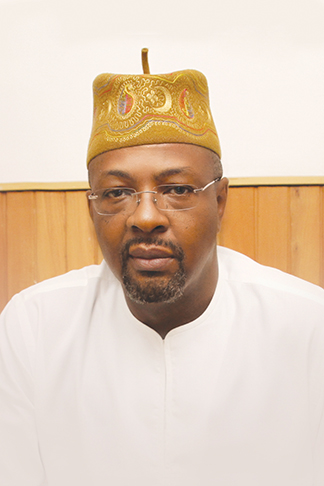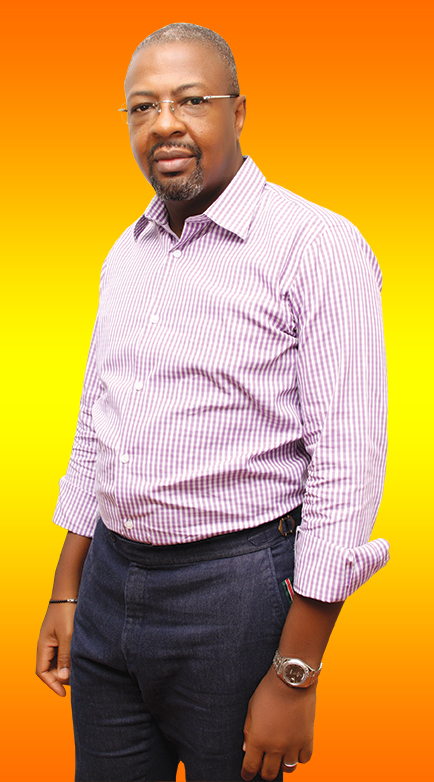Folarin Coker – Taking Tourism to the Next Level


After enjoying a long career with the Lagos State Government, Folorunsho Folarin Coker takes the helm of affairs as Director General of the Nigerian Tourism Development Corporation (NTDC). Not a novice to the problems facing the tourism industry, Mr. Folly Coker, as he’s fondly called, believes that we must build the inflow of international tourists into Nigeria on a solid foundation of domestic tourism.
As head of NTDC, his sole aim, he says, is to reverse negative perceptions in the minds of tourists and Nigerians about the country’s tourism through the recently launched ‘Tour Nigeria’ campaign with focus on growing and restructuring domestic tourism.
He tells Allure more about ‘Tour Nigeria’, his dream to rebrand Nigeria, his vision to make the tourism industry an alternative income and employment generating industry in Nigeria, his life outside the office and more.
What is the concept behind ‘Tour Nigeria’?
The focus of NTDC is domestic tourism. It is about using what we have to the very best of our advantage. There is nothing grand or special about ‘Tour Nigeria’; it is very focused, very direct and tourism is ‘Tour Nigeria’. We believe that inflow of international tourism into Nigeria can only be on a solid foundation of domestic tourism. If Nigerians are going to Nigerian hotels, using Nigerian airlines, flying around Nigeria, using Nigeria buses, it completes the value chain in tourism. Those institutions will start to grow. They will be better, regarding standard and quality, regarding the value of money to Nigerians who are using it and the institutions that govern those establishments will also grow.
In domestic tourism, I do not need to change naira into any foreign currency. I do not need to roam my phone. I probably speak the language of where I am going and I might have a friend, an aunt or cousin in that location. Nobody can cheat me because my currency is what I know.
For me to go to any part of Nigeria, I probably would fly or drive there, keeping my hard earned naira in my country to grow my currency. There is nothing wrong with ‘Made in Nigeria’. I am made in Nigeria. If I don’t love myself in Nigeria, how do I expect others to love what I have in Nigeria; it is a fundamental thing. So, ‘Tour Nigeria’ is just telling Nigerians to come from Lagos to Abuja and have a most peaceful weekend in a modern city. I am saying, instead of those business class tickets to South Africa or Dubai, invest the money in our tourism sector here.
Domestic tourism is the most difficult aspect of tourism because we are our greatest critics. If you go to a hotel in Sokoto, for instance, and they do not give you the value of your money, that hotel is in trouble. That is why we must build international tourism on a solid domestic tourism.
Is it a one-off campaign?
The ‘Tour Nigeria’ campaign is not a ‘one-off’ campaign but part of a more holistic promotional approach to develop community clusters and to help identify events and festivals that when put together, provide our visitors and citizens with authentic and memorable experiences. The key components to tourism are travel, accommodation, entertainment and hospitality. They would be explored with airlines, hotels, car hire services, tour operators and others to bring about affordable package tours to encourage Nigerians to tour Nigeria.
A lot of Nigerians travel abroad because we do not have spectacular tourist destinations here. What do you say to that?
Dubai did not happen overnight. A lot of money was spent to turn Dubai into what it is now. You should go and look at the villages of Dubai 20 to 30 years ago and compare it to Dubai of today. There is the issue of affordability. There is nobody who does not travel home to see their parents, wherever they come from. In one way or the other, we are all tourists. You are a tourist. I’m a political tourist in Abuja; the senators are political tourists in Abuja; members of the House are political tourists in Abuja, the President and Vice President, Senate President are all political tourists.
There is no nation that does not have disciples who come to pray in Nigeria; everybody is looking inward Nigeria. Why are Nigerians not looking inward Nigeria? That is my point; that is why I made it short and simple: ‘Tour Nigeria’. Tour it by air; tour it by bus and tour it by your private car. It is in touring Nigeria that you will strengthen the institutions and establishments in Nigeria to attract the international tourism that we want as an alternative to earning foreign exchange.
What states or places are your targets to tour in Nigeria?
Like I said before, ‘Tour Nigeria’ is a sub-brand from NTDC and we are just telling Nigerians what this is about. The next stage is the brand launch when we will launch the brand in Nigeria with a lot of activities; release our tourism calendar for the year with images to show off destinations and lots more.
Then, from the brand launch, we go to the bus tour; the ‘Tour Nigeria’. We will go to the six geo-political zones, simply visiting places of interest; highlighting to people and publicising the fact that these things exist in Nigeria. They may not look like the glamour of some of the places you go to in Europe but those places in Europe became like that because their people invested in them, believed in them, went through them over and over again to strengthen them, to become something that, globally, people aspire to go to.
That is the concept of the brand ‘Tour Nigeria’. We will be launching other brands over the years; we will have the food brand, the film brand, the fashion brand etc. The whole idea is just to package us; you can package yourself from here to Dubai or London; one price, one product. You can’t package yourself from here to Abuja because you must buy an airline ticket, local transport and hotel room independently while all these things in tourism economy are packaged and delivered. Packaging is an issue that we have to discuss with all the stakeholders in the value chain to be able to deliver. ‘One Lagos’ was a package that points to different components of the state and it delivered.
What was the experience like for you with the ‘One Lagos’ package?
I was fortunate that Governor Akinwunmi Ambode gave me the opportunity to package ‘One Lagos’ while I was in Lagos. It was a unique experience to experiment with certain things. What did we do with ‘One Lagos’? We just repackaged the cross-over ceremony from December of one year to January (of the) next year; we gave it a name, we gave it multiple locations and we asked people to come and do what they enjoy doing best, have something to eat, drink, watch some entertainment and relax with your neighbours.
There was no serious crime recorded in Lagos for the last five, six days while that festival held. It started in 2015. It is important to take a lesson from that, that is, tourism of bringing diverse people together; create an understanding that mitigates conflicts. If you and I are sitting together today – eating, drinking, listening to or watching something or enjoying whatever tourism asset it is, we start getting to know each other. It then becomes difficult for conflict to arise between us.
I will give you an example. South Africa did a cultural exchange programme about 40 years ago when Ipitombi came to perform here. They had political problems which we engaged in helping them to resolve. That was the beginning of the romance between Nigeria and South Africa. So you can see how culture, arts and tourism can be used to bind people and to reduce possibility of conflict because of a deeper understanding of who you are and who I am.
But with some of the security issues in the country, how do you hope to sell ‘Tour Nigeria’?
What security issues do we have? When last did somebody drive a car onto the pavement anywhere in Nigeria and just kill people? When last did somebody go to a school with a machine gun and just kill people at random or somebody took a butcher’s knife on a Friday evening and stabbed people? We are good at amplifying our problems and we are so lazy about amplifying what is good about Nigeria. Egypt has a security problem; an aircraft was blown up by terrorists but tourism is still there. What is the crime in Nigeria that is not even more random?
The greatest crime or murder rate in the world is not Nigeria; the greatest kidnapping rate is not in Nigeria and the greatest accident rate is not Nigeria, so why do we make it as if the problem in Nigeria is just so unique in a global context. We do not have a security problem; go to Mexico, Brazil, countries with similar populations. They have more security problems than we do. Yes, we have security issues. Yes, we are addressing them but should that stop our day-to-day living? Should that stop development of tourism in Nigeria?
I must also say, at this point, that the media is the anchor of the experience of people in tourism. There is a marriage between tourism and the media that we must celebrate every day or else tourism which is information will not thrive. Every time you say something negative about Nigeria in the press, you make Nigeria a little bit less attractive to foreign investments, foreign travellers and you reinforce the negative image of Nigeria.
Look at Paris, France; look at London, England; we don’t have those kinds of crimes. I want you to research. Where is the murder capital of the world? It’s not Nigeria. Where is the kidnapping capital of the world? It’s not Nigeria. So I charge the media with the responsibility of portraying a more positive image of Nigeria.
You were with Lagos State Government for years before your appointment at NTDC. What was the experience like for you?
The first day in office in any office was new; it was different and the experience I would always remember. I met a lot of good people. I saw a lot of potentials and we are a work-in-progress.
What has life lessons have you learnt to deal with others?
Life has taught me one word: surulere which means ‘patience’ is a virtue.
You are a stylish man; must it be a designer for you?
This top is by my tailor; made in Nigeria. This trouser is also by my tailor -made in Nigeria.
And your shoes?
Well, I have big feet so I’m working with a couple of people to try and see if they can help me get my feet into shoes that are worth it. Nigeria is your cheapest stylish. Nigeria is your most versatile stylist. What you have in terms of opportunities in the fashion world in Nigeria, the talent that is available here are enormous. I buy Nigeria; I wear Nigeria. I am Nigerian.
When you are not working, how do you relax?
I relax in the water; I love water. I swim, I boat. I just love water.
Is that also a way keeping fit as well?
God has made me as he has made me. But when I can, I gym and do some form of exercises and control what I eat. I try not to eat too much rice, too much bread; I’m not a young man so I must watch what I eat.
What is your eventual dream for Nigeria?
Make it an alternative income and employment generating industry in Nigeria.









